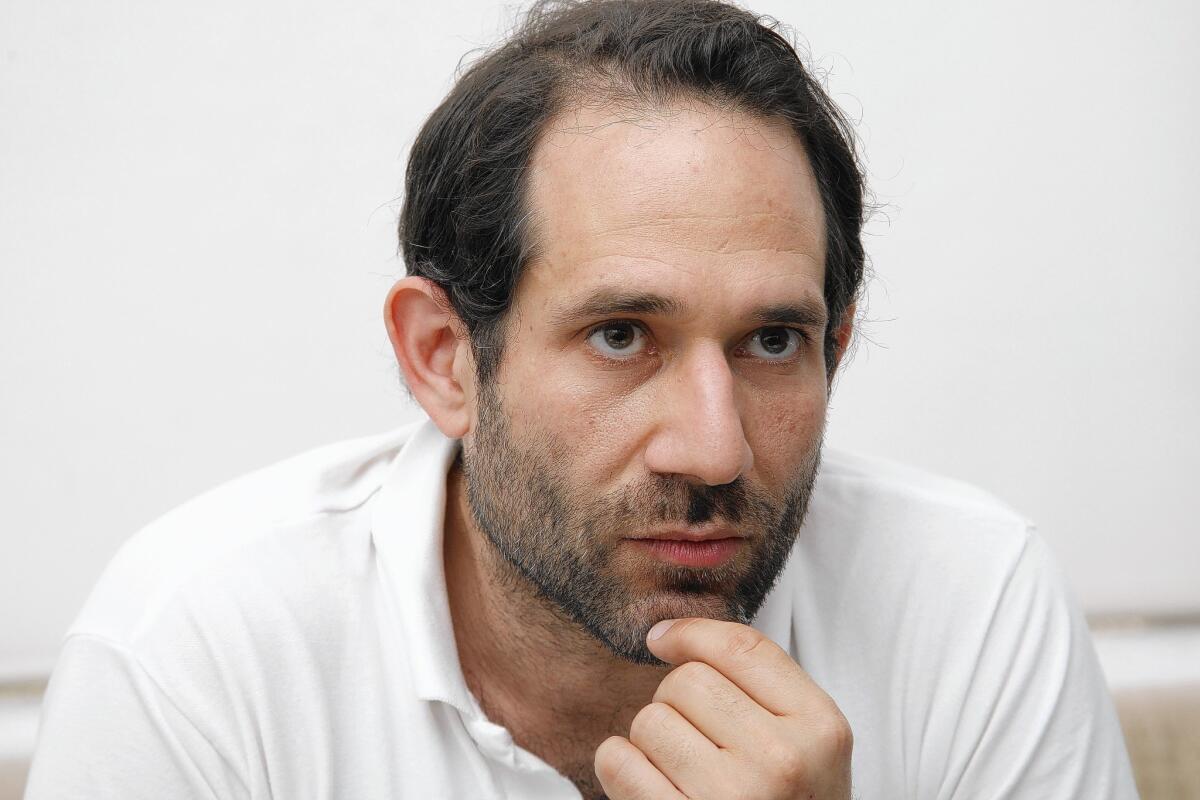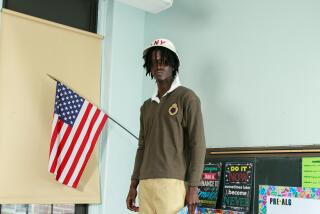For better or worse, Charney’s ouster is felt at American Apparel

- Share via
Behind the faded coral walls of American Apparel’s downtown L.A. factory, a seventh-floor corner office sits locked with the shade pulled low.
That’s where founder Dov Charney kept tabs on his often-troubled empire before the company’s board of directors booted him from his posts as chief executive and chairman in June.
For years, American Apparel Inc. has been Charney’s passion and his pulpit for iconoclastic views on women, fashion, domestic manufacturing and immigrant rights. His eccentricities sparked headlines — and the occasional sexual harassment lawsuit.
But it was his controlling — sometimes out-of-control — management style that played a bigger role in the Los Angeles company’s problems, according to interviews with more than a dozen current and former employees.
Charney led the company to a $270-million loss in the last four years; its stock, which peaked above $15 in 2007, recently traded for pennies. The company’s many financial and operational blunders have left it burdened with more than $200 million in debt.
Charney remains suspended while company-hired investigators look into misconduct allegations, including that he allowed the release of racy photos of a woman who was suing him. He insists that he was wrongfully targeted and that his personal life has had no bearing on his professional capabilities.
Every aspect of the provocative brand bore Charney’s stamp. He handpicked the company’s models and photographed them. He personally selected fabric dyes. He spent hours cleaning retail stockrooms.
When American Apparel’s new warehouse in La Mirada ran into trouble last year, Charney showered and slept there for three months.
Employees, friends and directors say Charney’s relentless drive was at once the company’s biggest asset and liability.
“Dov doesn’t do things by the book,” outgoing board member Robert Greene, a close friend before the shake-up, once told a Times reporter. “It takes a lot of courage because he could come under a lot of pressure for his unconventional ways.”
Since the coup, Charney has had some success working with Standard General, a New York hedge fund, to gain a nearly 44% shared stake in American Apparel, arrange up to $25 million in financial assistance for the company and replace all but two of the company’s seven directors. Charney is now a paid consultant without authority over employees.
“American Apparel is a company I care for deeply,” Charney said Monday. “The board has a process it has to go through and I am respectful of that process and am optimistic that there will be a positive outcome.”
Over the years, Charney has portrayed himself as a creative genius misunderstood by buttoned-up business types.
“As you rise, there’s going to be certain people that try and knock you down,” he once said.
Charney’s commitment to living wages and decent working conditions has been lauded by the retail industry. His reliance on young talent and his eye for trends have kept the brand fresh, supporters say.
“Dov is completely integral to the day-to-day running of American Apparel,” said Iris Alonzo, the company’s senior creative director until she was terminated shortly after Charney’s suspension. “If he were to not be put back into a leadership position, the steam would soon dissipate.”
Others say his behavior threatened to bring the company down.
His antics landed him in the center of several lawsuits, including one filed by a former store manager who alleged that Charney screamed epithets and rubbed dirt in his face. And there were sexual harassment allegations, salacious Internet photos, an online video of a nude Charney dancing with two women.
Some observers say the outlandish behavior may have helped the company in its early years. In 2004, a female reporter for Jane magazine wrote that Charney masturbated during an interview with her. The article raised American Apparel’s profile while cementing his reputation as a man with few boundaries.
“Obviously we were very aware, over the years, of the stories and all of the rumors,” said Allan Mayer, a crisis PR man and the new co-chairman of American Apparel. “We didn’t act until we established to our own satisfaction that removing him was the right thing to do.”
Charney’s backers contend he was pushed out on trumped-up misconduct allegations so the board could sell the beleaguered company.
Mayer denies that American Apparel is on the block. Instead, he said Charney’s ouster was his own doing.
Charney fashioned the company in his own image, so it lacked many of the formal controls common at traditional retailers.
Store employees didn’t get regular budgets, sales targets or schematics for how to lay out the shops, according to three former executives. There was no standard method for performance reviews or pay raises. The company was forced to fire about 1,800 immigrant workers in 2009 because of suspect identity documents not flagged by a deficient record-keeping system.
Critics accused Charney of promoting younger female employees who didn’t question his decisions. They called them “Dov’s girls.”
Charney rebuffed senior executives who argued for more structure. He remained the point person on all company matters.
“Classic founder’s syndrome,” one former employee said.
When directors — spurred by one financial crisis after another — brought in more seasoned executives, they often butted heads with Charney. That was the case with John Luttrell, an industry veteran hired in 2011 as its chief financial officer; he was named interim CEO last month.
Their tense relationship soured over the La Mirada automated distribution center, which Luttrell championed to save up to $5 million a year. Charney uncharacteristically kept his distance from the planning and construction.
Charney was on a business trip during the facility’s problem-plagued launch in early 2013. Inventory got mixed up, secondhand parts failed and some customers experienced delays or received the wrong orders.
When he returned, Charney took up residence at the warehouse. Some called it evidence of his dedication; others, his micromanagement.
It took three months to get the center operating to Charney’s satisfaction. He pushed hourly workers and high-level consultants to work as hard as he did, setting an example by unloading trucks himself.
This spring, Charney took it upon himself to clean up American Apparel’s finances.
He personally reviewed all company checks for more than two months. He also laid off dozens in departments including accounting, graphics, legal and marketing. The exits left some departments scrambling.
With Charney on suspension, a deep rift has formed among remaining executives.
Dozens of high-level managers remain loyal to Charney but fear that voicing support could threaten their jobs under a new regime. Many have described him as a mentor and continue to speak with him daily.
Although Charney isn’t allowed into American Apparel’s factory or stores, his influence looms large.
The hourly wage for the company’s factory workers averages about $12; some make up to $18, Marty Bailey, chief of manufacturing, said during a recent tour of American Apparel’s main factory. Workers also enjoy subsidized lunches, an on-site medical clinic and free massages.
At the company’s factories — the one in downtown L.A. is the largest garment factory in the nation — some 5,000 workers churn out about 200,000 pieces a day. Bailey said productivity numbers continued to be met, although several workers said Charney’s absence was felt.
There are some who question the company’s chances of survival without its founder.
“Can American Apparel survive without Dov?” said one Charney loyalist. “The answer to that is absolutely, unequivocally no.”
Twitter: @byandreachang, @ByShanLi
More to Read
Inside the business of entertainment
The Wide Shot brings you news, analysis and insights on everything from streaming wars to production — and what it all means for the future.
You may occasionally receive promotional content from the Los Angeles Times.












